|
Eugene McCarthy's 1968
Presidential Campaign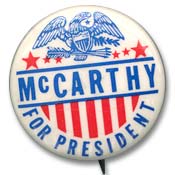
(See photos below)
 By 1967, opposition to the war in Viet Nam was spreading throughout the
Democratic Party. Many were frustrated at their inability to curtail the
war even though the Democrats controlled the federal government. Dissident
Democrats began looking for someone to challenge the re-election of President
Lyndon B. Johnson in the Spring primaries. Many considered it, but the
only high ranking Democrat willing to step forward was Senator
Eugene J. McCarthy of Minnesota.
By 1967, opposition to the war in Viet Nam was spreading throughout the
Democratic Party. Many were frustrated at their inability to curtail the
war even though the Democrats controlled the federal government. Dissident
Democrats began looking for someone to challenge the re-election of President
Lyndon B. Johnson in the Spring primaries. Many considered it, but the
only high ranking Democrat willing to step forward was Senator
Eugene J. McCarthy of Minnesota.
 On November 30, 1967, he announced that he would run against President
Lyndon Johnson for the nomination of the Democratic Party. Although the
press and polls were skeptical that McCarthy's candidacy could effectively
contest Johnson's war policy, young people in particular flocked to his
banner. Thousands left school and work to sleep on floors while walking
the streets and phoning the voters for primaries throughout the Spring.
On November 30, 1967, he announced that he would run against President
Lyndon Johnson for the nomination of the Democratic Party. Although the
press and polls were skeptical that McCarthy's candidacy could effectively
contest Johnson's war policy, young people in particular flocked to his
banner. Thousands left school and work to sleep on floors while walking
the streets and phoning the voters for primaries throughout the Spring.
 After McCarthy won 42 percent of the vote in the Demoratic primary,
the contest changed. On March 31, 1968, President Johnson announced that
he would not run for re-election. Two days later, LBJ received only 35
percent of the votes in the Wisconsin primary, to McCarthy's 56 percent.
After McCarthy won 42 percent of the vote in the Demoratic primary,
the contest changed. On March 31, 1968, President Johnson announced that
he would not run for re-election. Two days later, LBJ received only 35
percent of the votes in the Wisconsin primary, to McCarthy's 56 percent.
 In 1968, winning the primaries did not necessarily win delegate votes
at the national convention. The delegate selection process was often quite
separate from the popular vote, and usually controlled by the state party.
Consequently, McCarthy only received 23 percent of the 2622 votes at the
convention in August. Vice President Hubert Humphrey, a former Senator
from Minnesota who replaced LBJ as the candidate of the party establishment,
got the nomination on the first ballot with 67 percent. Torn by dissent,
the Democrats lost the Presidency in November by a razor thin margin.
In 1968, winning the primaries did not necessarily win delegate votes
at the national convention. The delegate selection process was often quite
separate from the popular vote, and usually controlled by the state party.
Consequently, McCarthy only received 23 percent of the 2622 votes at the
convention in August. Vice President Hubert Humphrey, a former Senator
from Minnesota who replaced LBJ as the candidate of the party establishment,
got the nomination on the first ballot with 67 percent. Torn by dissent,
the Democrats lost the Presidency in November by a razor thin margin.
 This
election prompted the Democrats to reform the nomination process. Two
commissions made several recommendations that were adopted for the 1972
convention. These made the choices of ordinary Democratic voters more
important in the allocation of delegate votes, and required that African-Americans,
women and youth be better represented at the convention. The number of
states which selected convention delegates through primary elections that
reflected the actual vote increased significantly. The nature of the nominating
process was never the same again. This
election prompted the Democrats to reform the nomination process. Two
commissions made several recommendations that were adopted for the 1972
convention. These made the choices of ordinary Democratic voters more
important in the allocation of delegate votes, and required that African-Americans,
women and youth be better represented at the convention. The number of
states which selected convention delegates through primary elections that
reflected the actual vote increased significantly. The nature of the nominating
process was never the same again.
Photos of Eugene McCarthy's 1968
Presidential Campaign by
Jo Freeman
|
Please click on thumbnails to view the complete
image
|
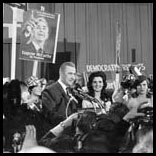 |
|
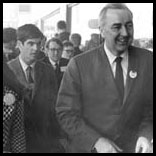 |
| |
Senator McCarthy campaigns in the Wisconsin
primary.
|
|
|
|
| |
Senator McCarthy campaigns in the Wisconsin
primary.
|
|
|
| |
|
|
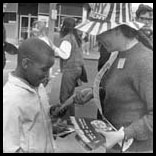
|
|
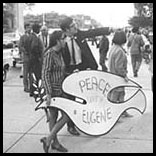
|
| |
" You're never too young...." The
Wisconsin primary, March 1968.
|
|
|
|
| |
McCarthy supporters arrive in Chicago for
the Democratic Convention.
|
|
|
| |
| |
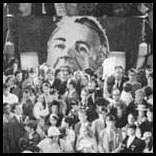
|
| |
"McCarthy rising from the people"
is the impression given by the McCarthy banner draped over
the railing in the lobby of the Hilton Hotel, Democratic convention
headquarters in Chicago.
|
|
|
| |
| |
| |
|
|
